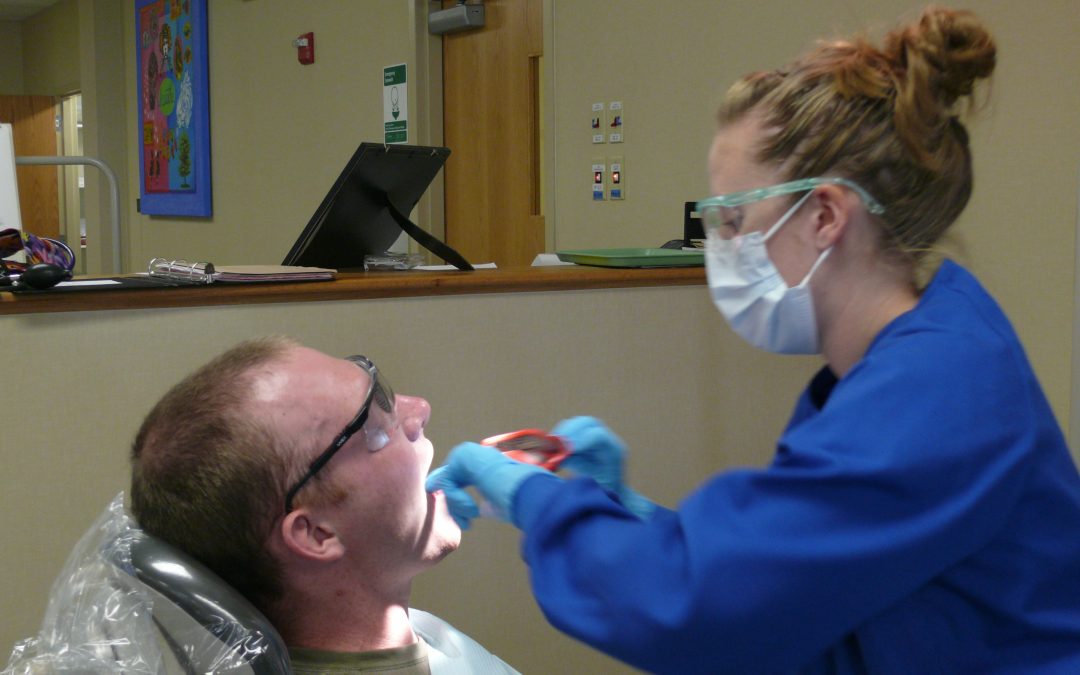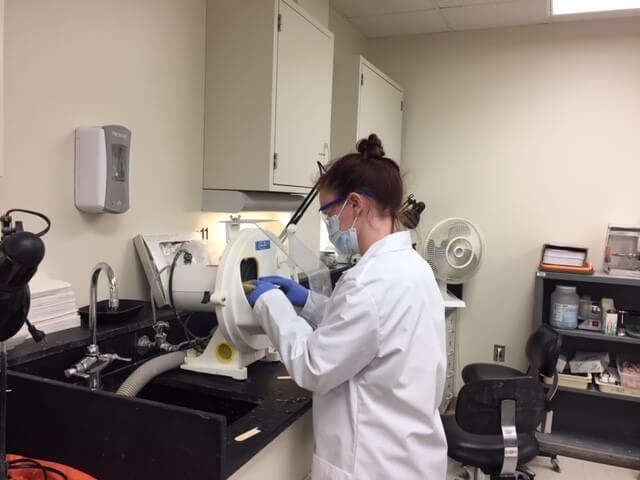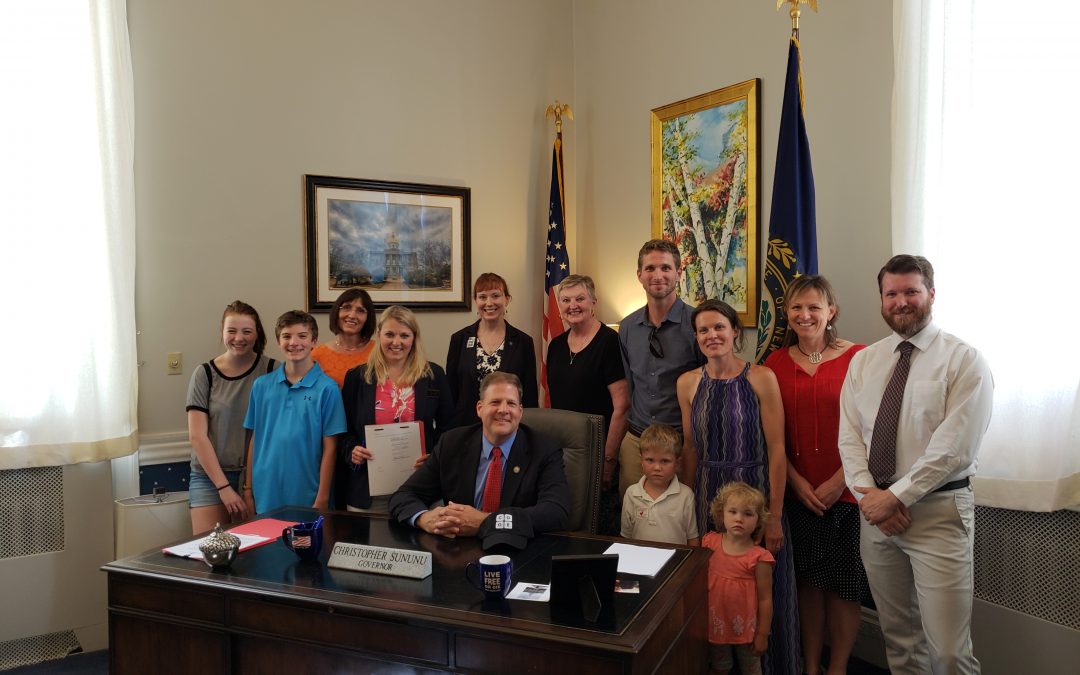
Nov 18, 2020 | College, Industry
In response to a shortage of dental assistants in New Hampshire and across the nation, NHTI, Concord’s Community College launched Dental Assisting Science I this fall for New Hampshire high school sophomores, juniors and seniors.
According to Joseph Wholley, who is currently enrolled in the course this semester, Dental Assisting Science 1 allowed him to explore topics that he would not necessarily be able to learn about in high school.
“As a bonus, I have earned college credits that will transfer to other colleges,” he said. “Learning more about our teeth that we have used everyday for our whole life has totally changed my perspective about keeping my teeth clean and healthy, too.”
The course, noted Kelly O’Brien, who teaches it, represents “a great way to start exploring this career field.”
“You have the benefit of completing the course on your own schedule while still receiving weekly assignments and communication from the instructor,” she said.
The course also underscores “the exciting and rewarding high-demand career” of Dental Assisting itself.
“In addition to assisting the dentist and performing duties around the office, you also interact with patients and ensure that all of their needs are met,” added O’Brien.
The program at NHTI, according to Ashley Buchanan, who graduated in July, builds “a great foundation.”
“It’s given me the knowledge of common dental materials used, procedures performed, anatomy of the oral cavity and dental instruments,” she explained. “This program covers a wide variety of topics and allows you to graduate with an understanding of how the field of dentistry operates and what role you play in the office dynamic.”
Noting NHTI is a CODA-accredited school, Buchanan said such a designation enables her to be one step closer to acquiring her certification. She said it also demonstrates her interest and dedication to her education and career.
“I am thankful for my opportunity to learn at NHTI and to be able to share what I have learned with the patients I see daily,” she said.
Dental Assisting Science I is part of the Community College System of New Hampshire’s eStart program, which offers courses with a tuition of $150 plus the cost of books. Students who complete and pass the course qualify for tuition reimbursement through the Governor’s STEM initiative.
Subjects covered in Dental Assisting Science I include the anatomy of the head with an emphasis on the osteological landmarks and structures of the oral cavity. Both permanent and primary dentitions are covered, including embryonic development and eruption patterns, as well as an introduction to the structure and function of the human body systems in health and disease.
To learn more about the course, or enroll, visit https://www.ccsnh.edu/colleges-and-programs/programs-for-high-school-students-to-earn-college-credit/estart/2020-course-schedule.

Aug 22, 2020 | College, Industry, STEM
Citing a shortage of dental assistants in New Hampshire and across the nation, Lisa Scott, Dental Assisting Program Coordinator at NHTI, Concord’s Community College, set about to develop an online course in its Dental Assisting Program.
Her efforts have resulted in Dental Assisting Science I, available for the first time this fall for New Hampshire high school juniors and seniors.
“I wanted to create something more accessible to students in the state who would have to drive a long distance to take the course if it wasn’t available online,” she said.
Dental Assisting Science I is part of the Community College System of New Hampshire’s eStart program, which offers courses with a tuition of just $150 plus the cost of books.
Scott said students who complete and pass the course, however, qualify for tuition reimbursement through the Governor’s STEM initiative.
“This is a great opportunity for students who might have an interest in this career pathway, and the cost is very minimal,” she said.
As for the course itself, it is 3-credits, which can be transferred when students are accepted into the dental assisting one-year certificate program, the only one in NH accredited by the Commission on Dental Accreditation.
Subjects covered in Dental Assisting Science I include the anatomy of the head with an emphasis on the osteological landmarks and structures of the oral cavity. Both the permanent and primary dentitions are covered, including embryonic development and eruption patterns, as well as an introduction to the structure and function of the human body systems in health and disease.
She said the course rhetorically answers several questions.
“Did you know every tooth has a name and a number?” she said. “Ever wonder what those bumps are all over your tongue?
Other questions include: Did you know the oral cavity can give us information about diseases in the rest of the body and did you know teeth were part of the digestive system?
“This course is a great way to explore the dental assisting profession as a career option,” said Scott, who said program graduates are able to perform a variety of duties.
“They are qualified to perform all of the expanded duties that are legal in New Hampshire, such as coronal polishing, exposing dental x-rays, placing sealants, monitoring nitrous oxide and other duties,” she said.
According to Scott, who is also a Certified Dental Assistant and Dental Hygienist, the course serves as a gateway to what she describes as “an exciting and rewarding career.”
“As a healthcare provider, dental assistants help patients with good oral health and overall health, and it is a career I have very much enjoyed,” she said.
To learn more about the course, or enroll, contact Scott at lscott@ccsnh.edu or Kelly O’Brien at kobrien@ccsnh.edu.
Program information is also available at https://www.ccsnh.edu/colleges-and-programs/programs-for-high-school-students-to-earn-college-credit/estart/2020-course-schedule.

Aug 20, 2020 | Challenges and Opportunities, College
While the continued pandemic presents many unknowns, the New Hampshire Lodging & Restaurant Association (NHLRA) continues to look for opportunities to engage both students and industry.
“The association had to pivot quite a bit to be able to support the hospitality industry to the best of our ability,” said Amie Pariseau, Education and Workforce Development Director.
On the education side of her job, Pariseau said she has been mindful of not wanting to lose her connection with students, many of whom are learning remotely.
“Jumping off the Virtual New Hampshire Hospitality Month idea, I built a YouTube channel called Explore NH Careers, which is also a website with the same name,” she said. “The YouTube channel will be shared with Extended Learning Coordinators, CTE teachers, traditional teachers, VLACS, and community partners, such as Project SEARCH, Girl Scouts, and Girls Inc.”
The content, she said, is varied and includes everything from cooking demonstrations and learning about cuts of beef to industry tours and industry chats.
“It’s a work in progress,” said Pariseau, who noted several industry members “are ready to join in on Zoom chats and demonstrations.”
“I will also be working with the Department of Education to learn about their preferred platform in order to share documents and other tools,” she added.
Regarding her focus on the workforce, Pariseau said she continues to promote the NH Restaurants, Hotels, & Attractions Job Board and connect community partners, such as Veterans Affairs to jobs.
“I just try to support them the best I can through this time,” she said.
According to Pariseau, though, the pandemic has presented NHLRA with a somewhat stark reality.
“In March through June, I lost the opportunity to showcase the industry to middle school and high school students,” she explained.
April had also been set as New Hampshire Hospitality Month in which 500+ students were scheduled to tour properties around the state and learn about the different opportunities and career pathways in the industry.
“I created a YouTube playlist for Virtual New Hampshire Hospitality Month, which I hoped to fill with tours,” said Pariseau. “With the industry trying to survive, it was particularly hard to ask them to participate, though, and so it’s mostly populated with cooking demonstrations.”
On the workforce side, the training NHLRA scheduled in partnership with Granite State College, “Fundamentals of Hospitality Management,” was canceled in the spring.
“With the college only offering programs virtually in the fall, we have decided to forgo this training at this time.,” she noted. “We have been working diligently, however, on sharing training tools through both the National Restaurant Association and American Hotel & Lodging Educational Institute, which have been free or low cost.”
In looking ahead, Pariseau said she and NHLRA will continue to work on finding the best ways to interact with students.
“They are the future generation of this industry,” she said.
Without the ability to get them out to see the industry behind the scenes, talk to people who are passionate about what they do and give them hands on experiences, Pariseau acknowledges she is worried.
“I can’t promote hospitality as a viable career path,” she said. “Virtual learning is a real challenge for me to overcome to be able to promote the industry that drives New Hampshire’s economy, but it is one I am tackling head-on.”
To learn more about NHLRA, or NHLRA’s Hampshire Hospitality Employee Relief Fund which has provided close to $150,000 to hospitality employees impacted by the coronavirus, visit https://www.nhlra.com.

Jun 1, 2020 | Challenges and Opportunities, College, Industry, Programs
For adult learners who want to earn an associate degree in 20 months or certificate in 10 months, the Accelerated Lifelong Learning Program (ALL) at Nashua Community College (NCC) may be for you.
Developed by Samantha Belcourt, CTE and Continuing Education Coordinator, ALL is scheduled to launch in fall 2020 with the following programs:
- Business Administration AS: Management
- Business Administration AS: Small Business Entrepreneurship
- Psychology AA
- Data Analytics Certificate (10 month program)
While the program lays out a fast-track, Belcourt said ALL’s cohort-structured schedule provides a pathway to success for committed students.
“The structured schedule is designed for adults to plan ahead of time and know what to expect for class time and homework,” she said. “It combines online, evening and weekend education to complement a 9 to 5 work schedule. Adult learners can still work while they engage in a full-time college schedule.”
Belcourt said she was inspired by a similar program that helps adult learners in California.
“I learned about it this past fall at a conference with Complete College of America,” she explained. “That program [in California] has had a huge success in this accelerated style. I think many people are looking for this type of fast-paced credential to get them where they want to be.”
With increased economic stressors on individuals and businesses since the health crisis began, Belcourt said that “it’s a good time to have the option of an accelerated degree and certificate pathway.”
“A lot of companies have now laid off employees, and people are not sure yet about their education goals,” she added. “I am hoping people will find this program helpful while unemployed to gain more credentials.”
As for who makes for an ideal candidate for the program, Belcourt cited “motivated students looking to get ahead fast.”
“It’s good for someone who has started some college in the past and wants to return and get their degree at an accelerated pace,” she said. “ALL is also good for high school students who are comfortable with an accelerated pace…For students with the ultimate goal of a bachelor’s degree, ALL also creates a pathway to the Granite State College accelerated bachelor program.”
To learn more about ALL, visit https://www.nashuacc.edu/academics/all.

Nov 8, 2018 | College, Impact, Industry, Programs
With the majority of STEM jobs in computing and a projected job growth of 13% compared with 6.5% growth across all occupations, the need for computer science education has never been greater.
It is this need that in part led Creative Computing Challenge (CCC), a five-year program funded by the National Science Foundation, to establish CS4NH. A working group of business/industry, non-profits, and K-12/higher education members collaborating to bring computer science to all New Hampshire K-12 students, CS4NH is working to increase access to and participation in Computer Science educational opportunities.
CS4NH’s Terry Wolf, a NH state legislative representative and vice chair of the House Education Committee, cited “a huge shift” in the public’s understanding of the need for computer science education.
“Not too long ago, people thought Computer Science only needed to be offered at the high school level as an elective,” she explained. “Today, people want kids to be more than consumers of technology. They want them to be the creators, innovators and problem solvers.”
She said this shift in understanding, furthered by advocacy efforts by CS4NH, led to the passage of NH House Bill 1674 earlier this year, which made Computer Science as a core K-12 subject area.
“After listening to a wide variety of stakeholders, adding Computer Science to the definition of an adequate education matched what people are looking for,” she said. “The bill passed with wide bipartisan support in the legislature.”
CS4NH’s Beth Doiron, Director of College Access and DOE programs and initiatives at the community college system of NH, said skills learned in computer science courses help students build basic problem-solving skills.
“Computer science instruction helps students understand how to accomplish tasks more efficiently and help them be better prepared for college in general, regardless of their career or program major choice,” she said.
CS4NH has forged several strategic partnerships, including one with the New Hampshire Tech Alliance, which Executive Director Matt Cookson said makes sense for them in several ways.
“CS4NH goals align perfectly with the goals of our Workforce Development committee and mission of the organization,” he said. “Being able to house the efforts of CS4NH and support its growth and implementation was a logical step as we look to encourage more young people to learn about Computer Science in New Hampshire.”
Judith Burrows, Director of Student Aid at the New Hampshire Charitable Foundation, another CS4NH collaborator, said her biggest takeaway from computer science is the thought processes such a curriculum seeks to encourage.
“Computational thinking is much more than just programming or IT,” she said. “It is foundational for all businesses. It really is the currency that businesses are looking for regardless of the field.”
Citing computational thinking as “the backbone” of various forms of technology, Lori Langlois, Director, North Country Education Services, said Computer Science addresses current and future needs.
“Given the known workforce shortages in NH in computer programming, web development, and other skilled computing fields, CS4NH has an important role in advocating to increase access and participation in CS to foster these career paths for students,” she said.
Langlois said CS4NH is particularly important in her region.
“For the North Country, computer science holds the potential for developing an
innovation economy,” she said. “In order to attract new or expanding businesses, northern NH schools are focusing on computer science with the intention of making visible, the young, energetic, and talented individuals we are developing for a STEM-skilled employee pipeline.”
To learn more about CS4NH, or any related initiative, visit cs4nh.org.
This is the final story of a multi-part series on CCC and the relevance of computational thinking in the classroom and industry in NH.

Feb 9, 2018 | College, Tid Bits
75% of students who complete a career pathway go on to college!






